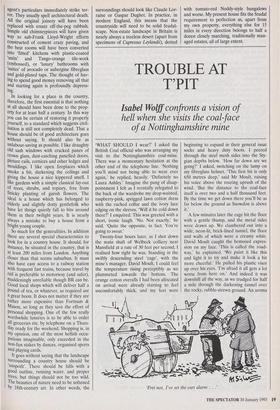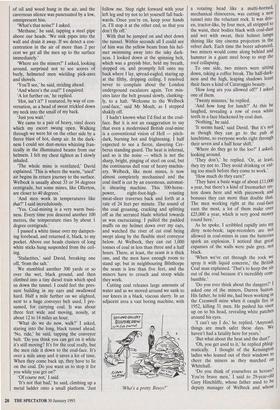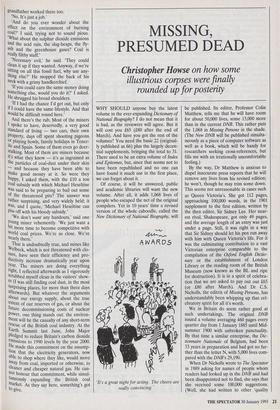TROUBLE AT T'PIT
Isabel Wolff confronts a vision of
hell when she visits the coal-face of a Nottinghamshire mine
`WHAT SHOULD I wear?' I asked the British Coal official who was arranging my visit to the Nottinghamshire coal-mine. There was a momentary hesitation at the other end of the telephone line. 'Nothing you'll mind not being able to wear ever again,' he replied, heavily. 'Definitely no Laura Ashley.' Imagine the pang of disap- pointment I felt as I mentally relegated to the back of the wardrobe my drop-waisted, raspberry-pink, sprigged lawn cotton dress with the ruched collar and the ivory lace edging on the sleeves. Will it be cold down there?' I enquired. This was greeted with a short, ironic laugh. `No. Not exactly,' he said. 'Quite the opposite, in fact. You're going to sweat.'
Twenty-four hours later, as I shot down the main shaft of Welbeck colliery near Mansfield at a rate of 30 feet per second, I realised how right he was. Standing in the swiftly descending steel 'cage', with the mine's manager, David Moult, I could feel the temperature rising perceptibly as we plummeted towards the bottom. The orange cotton overalls I had been allocated on arrival were already starting to feel uncomfortably thick, and my feet were beginning to expand in their general issue socks and heavy duty boots. I peered through the steel mesh sides into the Sty- gian depths below. 'How far down are we going?' I asked, switching on the lamp on my fibreglass helmet. 'This first bit is only 650 metres deep,' said Mr Moult, raising his voice above the roaring uprush of the wind. 'But the distance to the coal-face itself is over two and a half thousand feet. By the time we get down there you'll be as far below the ground as Snowdon is above it.'
A few minutes later the cage hit the floor with a gentle thump, and the metal sides were drawn up. We clambered out into a wide, neon-lit, brick-lined tunnel, the floor and walls of which were a creamy white. David Moult caught the bemused expres- sion on my face. 'This is called the road- way,' he explained. 'We paint it like this and light it to try and make it look a bit more cheerful.' He pulled his plastic visor up over his eyes. `I'm afraid it all gets a lot worse from here on.' And indeed it was downhill all the way, as we trudged for half a mile through the darkening tunnel over the rocky, rubble-strewn ground. An aroma 'Fret not, I've set the cart alarm . . of oil and wood hung in the air, and the cavernous silence was punctuated by a low, omnipresent hiss.
`What's that noise?' I asked.
`Methane,' he said, tapping a steel pipe above our heads. `We sink pipes into the wall and drain it away. If we detect a con- centration in the air of more than 2 per cent we get all the men up to the surface immediately.'
`Where are the miners?' I asked, looking around, surprised not to see scores of burly, helmeted men wielding pick-axes and shovels.
`You'll see,' he said, striding ahead.
`And where's the coal?' I enquired.
'A lot further on,' he replied.
`Hot, isn't it?' I ventured, by way of con- versation, as a bead of sweat trickled down my neck into the small of my back.
`Just you wait.'
We came to a pair of heavy, vinyl doors which my escort swung open. Walking through we were hit on the other side by a fierce blast of hot, damp air. In the dark- ness I could see dust-motes whizzing fran- tically in the illuminated beams from our helmets. I felt my chest tighten as I slowly inhaled.
`The whole mine is ventilated,' David explained. 'This is where the warm, "used" air begins its return journey to the surface. Welbeck is usually about 33 or 34 degrees centigrade, but some mines, like 011erton, are closer to 40 degrees.'
`And men work in temperatures like that?' I said incredulously.
`Yes. Coal-mining is a very warm busi- ness. Every time you descend another 100 metres, the temperature rises by about 1 degree centigrade.'
I passed a white tissue over my dampen- ing forehead, and returned it, black, to my pocket. Above our heads clusters of long white sticks hung suspended from the ceil- ing.
`Stalactites,' said David, breaking one off, 'from the salt.'
We stumbled another 300 yards or so over the wet, black ground, and then climbed into a tiny diesel train which sped us down the tunnel. I could feel the pres- sure building in my ears and swallowed hard. Half a mile further on we alighted, next to a huge conveyer belt used, I pre- sumed, for carrying coal. It was about three feet wide and moving, noisily, at about 12 to 14 miles an hour.
`What do we do now, walk?' I asked, staring into the long, black tunnel ahead. No, ride,' he said, tapping the conveyor belt. `Do you think you can get on it while it's still moving? It's for the coal really, but the men ride it down to the coal-face. It's over a mile away and it saves a lot of time. When they come back up, they have to lie on the coal. Do you want us to stop it for you while you get on?'
'Of course not,' I said.
'It's not that bad,' he said, climbing up a metal ladder onto a small platform. 'Just follow me. Step right forward with your left leg and try not to let yourself fall back- wards. Once you're on, keep your hands in. I'll stop it at the other end, so that you don't fly off.'
With that he jumped on and shot down the tunnel. Within seconds all I could see of him was the yellow beam from his hel- met swimming away into the inky dark- ness. I looked down at the spinning belt, which was a greyish blur, held my breath, stepped on, and promptly fell onto my back where I lay, spread-eagled, staring up at the filthy, dripping ceiling. I resolved never to complain about the London underground escalators again. Ten min- utes later the belt ground slowly, clanking- ly, to a halt. 'Welcome to the Welbeck coal-face,' said Mr Moult, as I stepped shakily off.
I hadn't known what I'd find at the coal- face. But it is not an exaggeration to say that even a modernised British coal-mine is a conventional vision of Hell — pitch- dark, burning hot and frightening. I half expected to see a fierce, slavering Cer- berus standing'guard. The heat is infernal, and so is the noise — which is not the sharp, bright, pinging of steel on coal, but the continuous dull roar of heavy machin- ery. Welbeck, like most mines, is now almost completely mechanised and the coal itself is cut by an enormous, automat- ic shearing machine. This 500-horse- power, eight-foot-high- rotating meat-slicer traverses back and forth at a rate of 24 feet per minute. The sound of the coal groaning, cracking and splitting off as the serrated blade whirled towards us was excruciating. I pulled the padded muffs on my helmet down over my ears, and watched the river of cut coal being swept along by the flexible steel conveyor below. At Welbeck, they can cut 1,000 tonnes of coal in less than three and a half hours. There, at least, the seam is a thick one, and the men have enough room to stand up; but in neighbouring Bilsthorpe the seam is less than five feet, and the miners have to crouch and stoop while they work.
Cutting coal releases large amounts of water and as we moved around we sank to our knees in a black, viscous slurry. In an adjacent area a vast boring machine, with `Who's a pretty Beuys?' a rotating head like a multi-horned, mechanical rhinoceros, was cutting a new tunnel into the reluctant rock. It was driv- en, tractor-like, by four men, all stripped to the waist, their bodies black with coal-dust and wet with sweat, their helmet lamps shining like tiny cinema projectors in the velvet dark. Each time the borer advanced, two miners would come along behind and hammer in a giant steel hoop to stop the roof collapsing. To one side, two miners were sitting down, taking a coffee break. The half-dark- ness and the high, leaping shadows leant their faces a kind of Caravaggio beauty. `How long are you allowed off?' I asked one of them.
`Twenty minutes,' he replied. `And how long for lunch?' At this he laughed, revealing a row of even white teeth in a face blackened by coal dust.
`Nothing,' he said. 'It seems hard,' said David. 'But it's not as though they can go to the pub at lunchtime, so everyone works right through their seven and a half hour shift.'
`Where do they go to the loo?' I asked, looking around. `They don't,' he replied. 'Or, at least, they try not to. They avoid drinking or eat- ing too much before they come to work.'
`How much do they earn?' `They have a basic wage of about £11,000 a year, but there's a kind of freemarket sys- tem down here and with piecework and bonuses they can more than double that. The men working right at the coal-face earn the most, a lot of them make over £25,000 a year, which is very good money round here.'
As he spoke, I scribbled rapidly into my dirty note-book; tape-recorders are not allowed in coal-mines in case the batteries spark an explosion. I noticed that great expanses of the walls were pale grey, not black.
`When we've cut through the rock we spray it with liquid concrete,' the British Coal man explained. 'That's to keep the air out of the coal because it's incredibly com- bustible.'
`Do you ever think about the dangers?' I asked one of the miners, Darren Sutton. His father, he told me, had been working in the Cresswell mine when it caught fire in 1952, killing 31 men. He pushed his visor up on to his head, revealing white patches around his eyes. `I can't say I do,' he replied. Anyroad, things are much safer these days. We haven't had a fatality here for years.' `But what about the heat and the dust?'
`Oh, you get used to it,' he replied phleg- matically. I thought of the Kensington ladies who leaned out of their windows to cheer the miners as they marched on Whitehall.
`Do you think of yourselves as heroes? You're brave men,' I said to 29-year-old Gary Hinchliffe, whose father used to be deputy manager of Welbeck and whose grandfather worked there too.
'No. It's just a job.'
`And do you ever wonder about the effect on the environment of burning coal?' I said, trying not to sound pious. What about the sulphur dioxide emissions and the acid rain, the slag-heaps, the fly- ash and the greenhouse gases? Coal is really filthy stuff.' `Necessary evil,' he said. 'They could clean it up if they wanted. Anyway, if we're sitting on all this fossil fuel, why use any- thing else?' He mopped the back of his neck with a grimy handkerchief. If you could earn the same money doing something else, would you do it?' I asked. He shrugged his broad shoulders. `If I had the chance I'd get out, but only if I could have the same lifestyle. And that would be difficult round here.'
And there's the rub. Most of the miners I spoke to have, deservedly, a very good standard of living — two cars, their own Property, days off spent shooting pigeons or playing bowls, family holidays in Tener- ife and Spain. Some of them even go deer- stalking. Most of them are miners because it's what they know — it's as ingrained as the particles of coal-dust under their skin and because they have been able to make good money at it. So were they haPPy, I asked them, with the £10 a ton coal subsidy with which Michael Heseltine was said to be preparing to bail out some of the threatened pits? The answer was rather surprising, and very widely held; it was, and I quote, 'Michael Heseltine can Piss off with his bloody subsidy.' `We don't want any handouts,' said one Young miner vehemently. 'We just want a bit more time to become competitive with World coal prices. We're so close. We're nearly there.'
That is undoubtedly true, and mines like Welbeck, which is not threatened with clo- sure, have seen their efficiency and pro- ductivity increase dramatically year upon Year. The miners are doing everything tight, I reflected afterwards as I vigorously scrubbed myself clean in the visitors' show- er (1 was still finding coal dust, in the most surprising places, for more than three days afterwards). But whatever the arguments about our energy supply, about the true extent of our reserves of gas, or about the future decommissioning costs of nuclear Power, one thing stands out: the environ- ment will be the casualty of any short-term rescue of the British coal industry. At the Earth Summit last June, John Major Pledged to reduce Britain's carbon dioxide emissions to 1990 levels by the year 2000. He made this commitment on the assump- tion that the electricity generators, now able to shop where they like, would move away from coal, imported or otherwise, to cleaner and cheaper natural gas. He can- not honour that commitment, while simul- taneously expanding the British coal market. As they say here, something's got to give.












































































 Previous page
Previous page